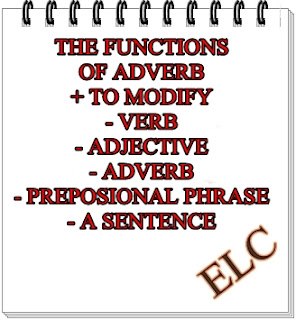The principal job of an adverb is to modify (give more information about) verbs, adjectives and other adverbs. In the following examples, the adverb is in bold and the word that it modifies is in italics.
Modify a verb:
- John speaks loudly. (How does John speak?)
- Mary lives locally. (Where does Mary live?)
- She never smokes. (When does she smoke?)
- Mary lives locally. (Where does Mary live?)
- She never smokes. (When does she smoke?)
Modify an adjective:
- He is really handsome.
Modify another adverb:
- She drives incredibly slowly.
But adverbs have other functions, too. They can:
Modify a whole sentence:
- Obviously, I can't know everything.
· Certainly, the thief chose the wrong profession.
Modify a prepositional phrase:
- It's immediately inside the door.
Other examples:
an adverb modifies other verbs(verbs are in bold/adverbs are in italics)
· The thief acts stupidly. (answers the question:how?)
· The thief never shoots, because he has no gun.(answers the question: when?)
· The thief robs locally. (answers the question:where?)
· The thief never shoots, because he has no gun.(answers the question: when?)
· The thief robs locally. (answers the question:where?)
an adverb modifies other adjectives (adjectives are in bold/adverbs are in italics)
· The thief is extremely stupid.
· This very dumb thief is now in jail.
· This very dumb thief is now in jail.
an adverb modifies other adverbs (adverbs in italics)
· The thief walks incredibly clumsily.
· The thief acts really stupidly.
· The thief acts really stupidly.
Adverbs also have other functions. You may see them modify a prepositional phrase:
· The thief was arrested just outside the apartment.

Komentar
Posting Komentar